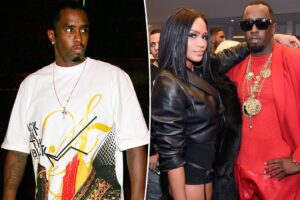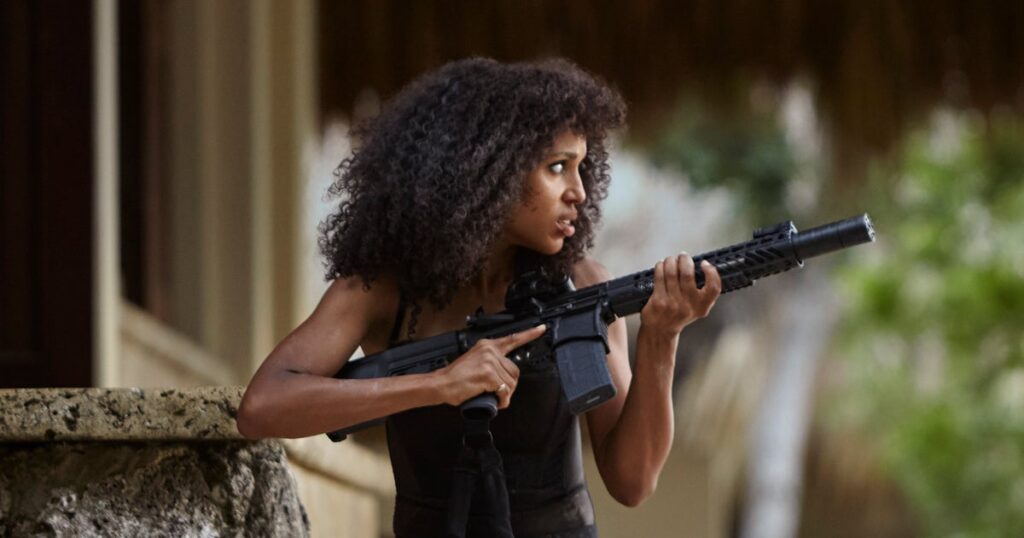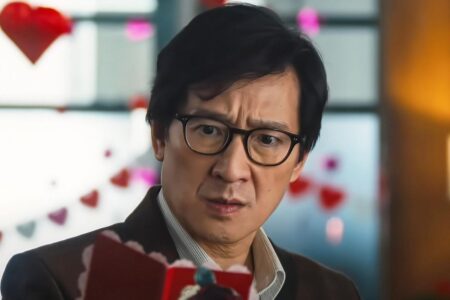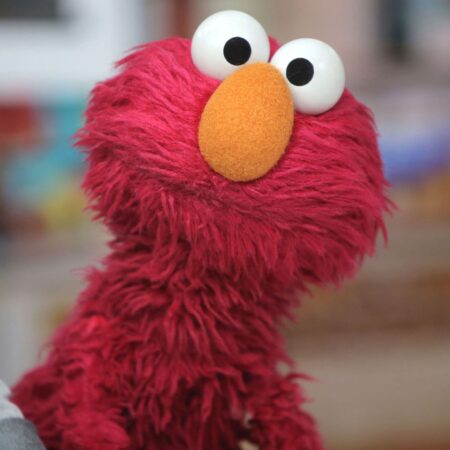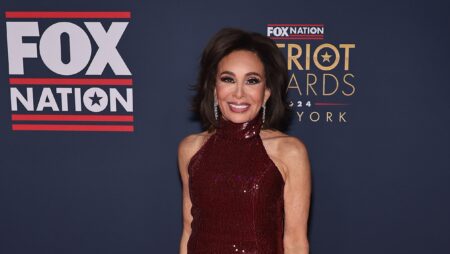Kerry Washington has long been a trailblazer, reshaping the narrative around how Black life, love, and leadership are portrayed on-screen. Whether commanding Thursday nights on “Scandal” or producing stories that reflect a fuller, more vibrant spectrum of Black experiences, she’s consistently pushed Hollywood forward — and she’s doing it again with her latest project, “Shadow Force.”
In this fresh, action-packed take on the Black family dynamic, Washington not only stars in the film but also steps behind the scenes as a producer. On-screen, she teams up with international superstar Omar Sy (“Lupin”) to bring the story to life.
“Shadow Force,” which is in theaters Friday, delivers a universal, high-stakes thrill ride centered on a former government agent couple who, after leaving a secretive elite organization to protect their son, must fight to survive when their past comes back to haunt them.
It’s a refreshing, adrenaline-charged reminder that action heroes — and complicated, resilient family stories — come in all forms. Washington’s latest move not only showcases her power as a leading lady but continues her mission to open doors and expand the way Black families and relationships are portrayed on-screen — rich, layered and full of heart.
In this interview, HuffPost chatted with Washington about stepping into an action thriller, starring with Sy, Cliff “Method Man” Smith and Da’Vine Joy Randolph, and being lethal and loving.
In “Shadow Force,” Kyrah is a woman who’s constantly protecting — her child, her love, her life. As a mother in real life, what parts of your own instincts did you pour into Kyrah that the audience might not even realize?
Before you become a parent, you hear people say, “Oh, I would kill for my child.” While it sounds like just a cute idea, when you actually become a parent, you understand that maternal instinct, that paternal drive that will make you do anything to protect your kid. So it was really fun to draw on that and to ask myself, if I was a highly trained assassin who could kill, what would it look like to protect my family at all odds?
There’s a moment in the film where love becomes a rebellion. How did it feel to play a character whose affection and protection aren’t weaknesses, but the fuel behind her power?
That is so beautifully put. I think that love can be the fire that lights us into action. I think so often we feel like we have to make decisions out of fear or out of being under threat. This family is under threat, but it’s their love for each other that gives them the strength to fight through. That is really inspiring to me, especially at a time where a lot of us feel like the world is so unpredictable and scary. To remember that our power is in our love and that if we can remind ourselves what we’re fighting for, that we’re fighting for love and family and the ability to hold on to our freedoms and liberties, that that can really keep us stronger for the long haul.
We’re watching more Black leads step into the action universe — but not just as muscle, as heart, brains and legacy. What’s the responsibility — or the opportunity — you felt stepping into this genre with that lens?
For me, it was personal first because while I was shooting this film, I was actually writing my memoir, “Thicker Than Water,” which is about my family’s journey into strength and into truth and into a deeper kind of courageous love for one another that’s rooted in transparency. I knew that I’ve played a lot of characters throughout my career that are mentally strong, psychologically strong, emotionally strong, but to play a character that was physically strong that felt like such an opportunity to take this kind of courage and strength that I was cultivating in my life and figure out how to embody it, how to have it live in my cells and take on a different kind of physical strength that could match what I felt like was the emotional strength that my family was gaining.
Sterling K. Brown was originally cast as Isaac and is now behind the scenes as a producer. How did that shift in dynamic influence the energy of the story you were building on screen?
Well, I think what was really exciting was as I adore Sterling, obviously, but when Omar signed on, the incredible Omar Sy from “Lupin” and many other incredible films, it made the film global. It reminded us that Black people are all over the world, that we have all different cultures and languages and identities. It suddenly became a film about transnational action, transnational love, love that could cross languages and territories to exist in a place that was so, so powerful. French is so sexy, too (laughs). So it added a layer of an international romance, but it also just made the film bigger. It leveled it up in a way that as a producer I was really excited for, and as an actor, I was excited when Omar came on. He was like, I want to bring more French into the film. I was like, that’s great.
Da’Vine Joy Randolph delivers such an electric performance in this, and Method Man is just effortlessly locked in. What surprised you most watching them work up close in this film?
I think the performances that Da’Vine and Method Man bring to the table are vital to making the film work because the film is so intense. Between their comedy and action, their chemistry with each other, it just brings the right level of levity that allows you to keep pushing through all the danger. They’re spectacular. I mean, I also love telling people like my stunt double worked a little bit while Da’Vine’s stunt double never got out of their chair. She did everything on her own, and she’s so badass. They’re magic together. Also, what’s not to love about Method Man? I mean, Cliff is just fantastic. He’s such a great actor. This whole cast is so wonderful. Mark Strong as our antagonist, as the bad guy; he’s such a legend. You don’t get to be a hero if you don’t have the right kind of bad guy making it look dangerous enough. His evil really allows us to step into a different kind of heroic journey, and I’m super grateful for that.
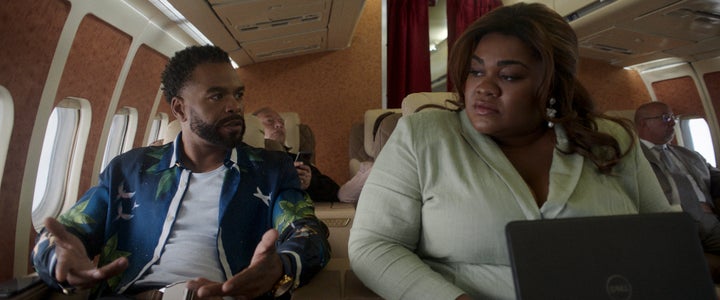
You’ve played women in crisis, women in power, women in love — but Kyrah lives in the in-between. What was something you pushed to make different with Kyrah?
She’s balancing so much. She’s balancing family and romance and politics and power and weapons. So I thought actually training in the way that I trained for this film, like a real athlete, was helpful to feel like what kind of a badass could hold all of that and make it work. There was a kind of physical strength that lent itself to the intensity of all of the issues and dynamics that are out at play for her.
We see Kyrah fighting against systems she helped build. If you think about your own career, what’s something you once believed about this industry that you’ve now unlearned or evolved from?
Well, I think when I first started out, I really had the mentality that a lot of actors have of like, “I hope people like me. I hope I get invited to the party.” I don’t mean the literal party, but I mean like, I hope people give me a job, that people offer me work that when I audition, that people like me enough to invite me into their projects. That kind of need for approval and for people to like me, it’s something that is very hard for many actors to metabolize and to live with. One of the greatest gifts of my career is stepping into producing and directing so that I’m no longer waiting to be invited to the party. I’m throwing my own party. I’ve made a career out of building my own table. It’s great because I built the table that I actually want to be at. I really am grateful for that shift in perspective for me that I’ve been really blessed enough to step into production so that I have more agency, more authority, more choice and more power.
In a world where Black women are rarely allowed to be both lethal and loving on-screen, what did it feel like to choreograph rage, romance and responsibility all in one body?
I love that question — to be lethal and loving. Wow. One of the things I love about this film is that not only do I get to play a badass mom, but we get to see this beautiful image of Black fatherhood in the film because he’s doing the primary parenting in a way that is so, so beautiful and powerful and inspiring and real.
So much of parenting, whether you’re a mother or father, is that balance between being fierce and being caring. You have to have good boundaries. You have to set limits, you have to protect them, you have to be strong, and you have to be present and patient and loving and open and listening. I think the film obviously sort of stretches these ideas to the maximum extent of drama and intensity. But all parenting is a version of being fierce and caring. I loved being able to play a character who lives in that reality as a mom and as a wife and as a badass.
“Shadow Force” is in theaters Friday.
Read the full article here


